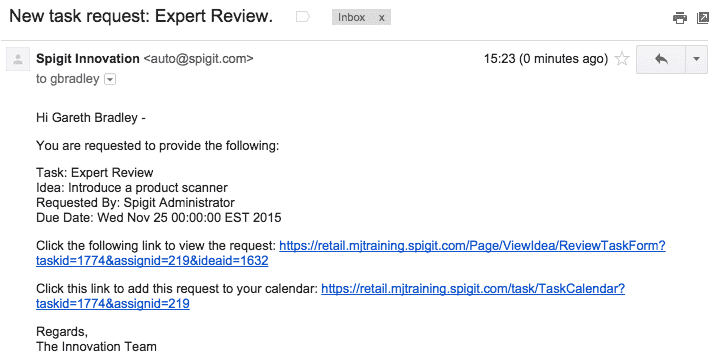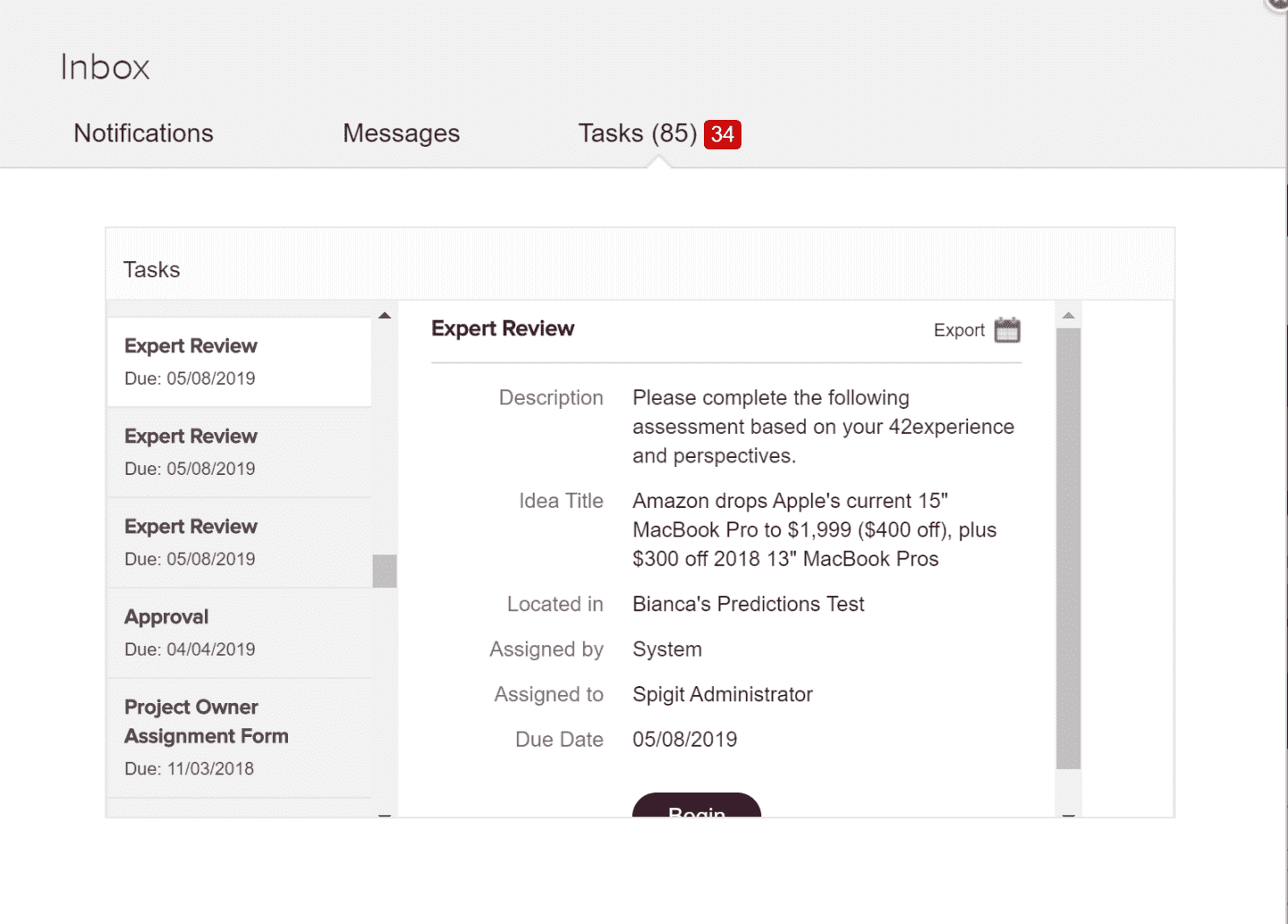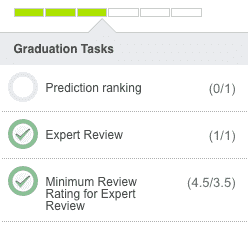In this article, we will discuss the Expert Role and its impact upon an Innovation Program.
- Introduction to the Expert Role
- Who experts typically are and why they are engaged
- The core activities inside the platform that an expert carries out
- The fit with the overall process
- Best practices
Definition
Inside the Planview IdeaPlace platform we often refer to our experts as Subject Matter Experts. This concept is not a new one; it has in fact been around for many years. Here at Planview IdeaPlace, we leverage this accepted concept and link the Subject Matter Experts to the crowd.
"A subject matter expert (SME) or domain expert is a person who is an authority in a particular area or topic. The term domain expert is frequently used in expert systems software development, and there the term always refers to the domain other than the software domain."
An expert is always aligned to their own domain rather than the software or practice of innovation itself. It’s important to remember that clear distinction.
Introduction to the Expert Role
Experts are a key group in any Innovation Program or Challenge. Before we drive into the detail, let us take a look at what skills and activities a normal expert would be associated with.
- Experts focus upon ideas rather than the crowd, and therefore, the skill set is often very unique to this role.
- Experts should be confident in offering advice and posting questions to idea owners, if needed.
- They should possess a strong understanding of the challenge question and area(s) of impact.
- Ideally, experts will have an understanding of the entire ecosystem in which ideas might be implemented, allowing them to perform accurate and relevant assessments on ideas.
- Finally, experts need to have the confidence of the sponsor, as they will be ultimately responsible for vetting the final selection of ideas.
These skills translate into some critical core activities:
- Experts are responsible for reviewing and evaluating ideas inside challenges.
- A good expert will also look to clarify questions about an idea or offer coaching advice to idea owners.
- They might also guide the crowd and act as a thought leader for their own particular area of expertise.
Why Was I Given This Role?
A question that often gets asked by new experts is, "Why was I given this role?"
That is often answered simply by three key elements.

The three key elements of Expert role assignment
First, you are trusted within your organization. Expert groups are often selected by or with the help of a challenge sponsor. This translates easily into a group of people that the innovation team and the sponsor are comfortable with. A by-product of this is that selected experts are often aligned with the Business Objectives of the challenge and strive to ensure that these objectives are met.
Second, you are skilled. Experts will typically have a proven background in leading, facilitating or driving success. Possessing at least one of these skills is a great quality to have in an expert. We also typically see the ability to carry out assessments quickly and accurately as another key skill that experts typically hold.
Finally, all experts must be knowledgeable in their area of expertise. This is where the link between their subject matter expertise and their selection really comes to the fore.
With this knowledge and the two other elements in play, we see the respect that experts hold among the crowd only becoming stronger.
Where Do Experts Fit In?
Now that we have identified the skills that experts possess, let us now take a look at where they would typically engage with the crowd inside a normal challenge process.

Site Health diagram
You may be familiar with the image above. This is taken from the Planview IdeaPlace platform, and it describes how the system manages the flow of ideas from their conception to selection. If this diagram is not familiar, see the article Site Health Page Update.
In the early stages of the challenge, we see organizations gather ideas from the crowd and allow collaboration to occur. As stronger ideas emerge, they move further downwards in our diagram into the next stage. During this stage, experts typically "scout" stronger ideas and look to to work with idea owners to develop ideas into even stronger concepts. Experts may also look to help the owners of ideas that, while strong, have not been supported as strongly by the crowd.
In our example, the Review stage is where the experts become directly involved with the crowd. Once an idea reaches the Review stage, an expert is selected by the Planview IdeaPlace platform to carry out a review. This review may be quantitative or indeed qualitative but it is the first point at which experts are leveraged formally for their input.
This is the primary task of the expert, and during the challenges run inside Planview IdeaPlace, it becomes the focus point. We will take a look at the mechanics of tasks shortly, but it is important to stress that the elements we described at the start of this article play out in this review stage. The trust is here in the form of the opinion experts share, the skills are present in the form of the assessment of the idea, and the knowledge is there in the imparting of the expertise. Without that blend, there is no easy way for the sponsor to be sure of the viability of the ideas in the stage. Simply put, it is best to view this activity as the process of grading ideas against the likelihood that they could be implemented.
Once Ideas have been evaluated by experts, decisions are made by both the sponsor and innovation team. The trust placed in the expert role is emphasized he, as it directly impacts the decisions made.
Expert Activity - Notifications
When a task is assigned to an expert, a notification is sent via email that prompts the expert to enter the system and access the review.

Once inside the system, experts can track their assigned tasks using the Inbox feature. All tasks are linked back to the inbox and housed in the task tab.

Let’s now look at task access and completion.
Expert Activity - Accessing the Review
Inside the inbox is a chronological listing of the tasks assigned to a user. Here we can see a task assignment and the details around the challenge location, who assigned it, and most important, the due date.

The tasks contained here are available, no matter when the expert logs in or where they log in within the Planview IdeaPlace platform.
Finally, there is the ability to export the task to a calendar, just to ensure that they don’t miss it.
Once we are ready to begin, the task can be accessed at the bottom of the window.
Expert Activity - Reviews
The tasks are generally quantitative in nature and experts are asked to complete tasks that look a little like the screenshot below.

Scoring is completed by selecting numbers from the list against the criteria, which we can see in this scenario are very generic. Normally, these criteria align with the challenge being run, so you could expect to see questions and criteria that would directly access the viability of an idea.
Reviews can also contain qualitative fields. We can see an example of this below. In these scenarios experts should share their more elaborate thoughts upon the ideas' viability.

Finally, once a review is completed, the score is averaged and posted inside the Idea page. When multiple reviews are carried out, we could expect to see those scores also represented as an average. These numbers would be used to move ideas forward in the process or to hold them in their current stage.


Best Practices
Here are some best practices that may prove useful to experts and act as pillars for internal training.
- First, experts should be reading all of the idea and comments around an idea. This helps to be ultra clear on the viability of an idea. It should also inform on more subtle content that may have come from the comment stream and not just the idea.
- Second, completion of the task on time is key. Non-completion of tasks can impact the overall timelines of challenges and progression. Remember, each task will contain a due date that can be exported to the calendar of an expert.
- Third, be sure to notify the relevant parties should a group of experts be unavailable during the challenge event.
- Finally, if there is doubt, refer to your central support team.
Frequently Asked Questions
Are private comments also viewable by experts?
Yes.










